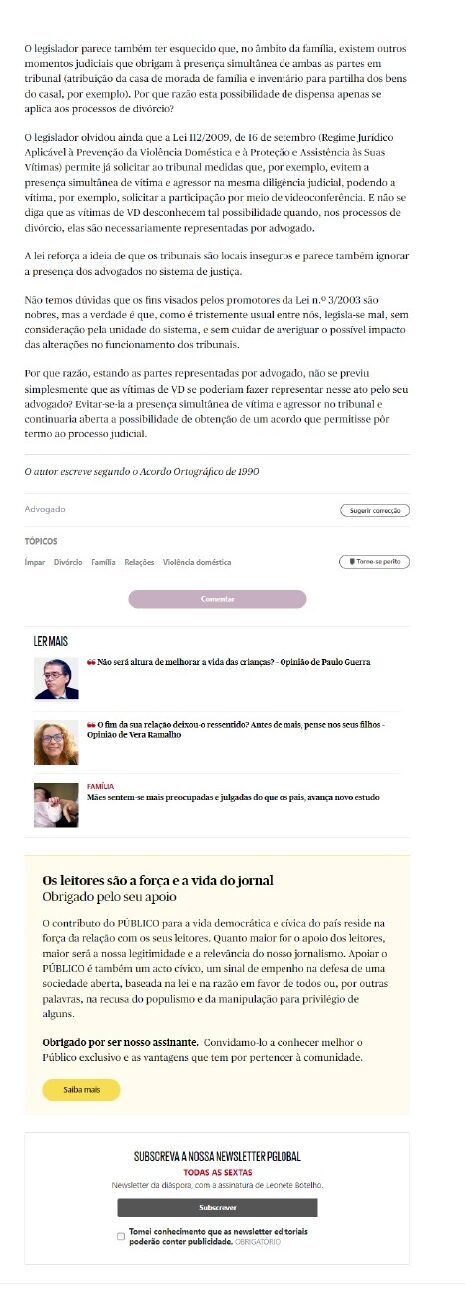Opinion article by our coordinator in the Público newspaper of 06/02/2023, regarding the dismissal of the conciliation attempt in divorce proceedings in cases of domestic violence. Read the article on Público’s website or in pdf and the translation below:
“Domestic violence and divorce proceedings: exemption from the conciliation attempt
The truth is that, as is sadly usual, legislation is passed badly, without consideration for the unity of the system, and without taking care to investigate the possible impact of the changes on the functioning of the courts.
The Assembly of the Republic recently approved a law that allows dispensing, in divorce proceedings, the attempt of conciliation in cases of domestic violence (DV). The idea seems to be to avoid revictimization by preventing this, the ends are noble, but the result leaves something to be desired.
The so-called “contentious” divorce process begins with the filing of the divorce petition with the court followed by an attempt at conciliation. Its objectives are to reconcile the spouses and, if this is not possible, to explore the possibility of converting the initially “contentious” divorce into mutual consent. And, decreed on the very day they take place.
Law 3/2023, of January 16, now provides that in cases of DV, the victim may request exemption from this attempt at conciliation, but only in cases where it was she who filed for divorce.
It is difficult to understand why this possibility is only foreseen for cases in which it was the victim who initiated the divorce proceedings, but not when it is the aggressor who initiates the proceedings. Either this is a manifest oversight in the law, or it is based on the erroneous belief that only the victims of DV file for divorce, but not the aggressors.
On the other hand, dispensing with the attempt at conciliation will also prevent the parties from reaching a consensus, pushing them to trial and thus perpetuating the litigation. It also prevents the parties from reaching an agreement on other issues to be decided (allocation of the family home, alimony between spouses, regulation of parental responsibilities with regard to the couple’s children, etc.).
The new law forces more bureaucracy, since the family court judge is not able to know if the defendant has been convicted or is a defendant in any domestic violence case against the other party, and even then he or she is obliged to inform the victim that he or she may request that the conciliation attempt be waived. This will require, according to the interpretation that the courts will make of this law, that prior inquiries be made to ascertain the existence of any DV process, also requiring additional orders and notifications.
The legislator also seems to have forgotten that, in the family sphere, there are other judicial moments that require the simultaneous presence of both parties in court (allocation of the family home and inventory for the distribution of the couple’s assets, for example). Why does this possibility of exemption only apply to divorce proceedings?
The legislator has also forgotten that Law 112/2009, of September 16 (Legal Regime Applicable to the Prevention of Domestic Violence and to the Protection and Assistance to its Victims) already allows the court to request measures that, for example, avoid the simultaneous presence of victim and aggressor in the same judicial proceeding, and the victim may, for example, request participation by videoconference. And let it not be said that DV victims are unaware of this possibility when, in divorce proceedings, they are necessarily represented by a lawyer.
The law reinforces the idea that courts are unsafe places and also seems to ignore the presence of lawyers in the justice system.
We have no doubt that the aims pursued by the promoters of Law no. 3/2003 are noble, but the truth is that, as is sadly usual among us, it legislates badly, without regard for the unity of the system, and without taking care to investigate the possible impact of the changes on the functioning of the courts.
Why, when the parties are represented by a lawyer, was it not simply provided that the victims of DV could be represented in this act by their lawyer? The simultaneous presence of victim and perpetrator in court would be avoided, and the possibility of reaching an agreement to end the legal proceedings would remain open.”

